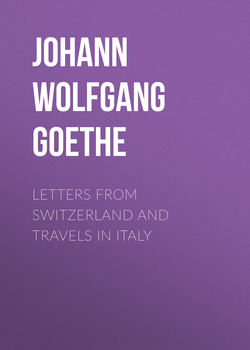Читать книгу Letters from Switzerland and Travels in Italy - Johann Wolfgang von Goethe - Страница 9
LETTERS FROM SWITZERLAND
PART THE SECOND
The valley of the Birsch
ОглавлениеAmong the ridges of the broad and lofty range of mountains the little stream of the Birsch found of old a channel for itself. Necessity soon after may have driven men to clamber wearily and painfully through its gorges. The Romans in their time enlarged the track, and now you may travel through it with perfect ease. The stream, dashing over crags and rocks, and the road run side by side, and except at a few points, these make up the whole breadth of the pass which is hemmed in by rocks, the top of which is easily reached by the eye. Behind them the mountain chain rose with a slight inclination; the summits, however, were veiled by a mist.
Here walls of rock rise precipitously one above another; there immense strata run obliquely down to the river and the road-here again broad masses lie piled one over another, while close beside stands a line of sharp-pointed crags. Wide clefts run yawning upwards, and blocks, of the size of a wall, have detached themselves from the rest of the stony mass. Some fragments of the rock have rolled to the bottom; others are still suspended, and by their position alarm you, as also likely at any moment to come toppling down.
Now round, now pointed, now overgrown, now bare are the tops of these rocks among and high above which some single bald summit boldly towers, while along the perpendicular cliffs and among the hollows below, the weather has worn many a deep and winding cranny.
The passage through this defile raised in me a grand but calm emotion. The sublime produces a beautiful calmness in the soul which entirely possessed by it, feels as great as it ever can feel. How glorious is such a pure feeling, when it rises to the very highest, without overflowing. My eye and my soul were both able to take in the objects before me, and as I was pre-occupied by nothing, and had no false tastes to counteract their impression, they had on me their full and natural effect. When we compare such a feeling with that we are sensible of, when we laboriously harass ourselves with some trifle, and strain every nerve to gain as much as possible for it, and as it were, to patch it out, striving to furnish joy and aliment to the mind from its own creation; we then feel sensibly what a poor expedient, after all, the latter is.
A young man, whom we have had for our companion from Basle, said his feelings were very far from what they were on his first visit, and gave all the honour to novelty. I however would say, when we see such objects as these for the first time, the unaccustomed soul has to expand itself, and this gives rise to a sort of painful joy – an overflowing of emotion which agitates the mind, and draws from us the most delicious tears. By this operation the soul, without knowing it, becomes greater in itself, and is of course not capable of ever feeling again such a sensation, and man thinks in consequence that he has lost something, whereas in fact he has gained. What he loses in delight he gains in inward riches. If only destiny had bidden me to dwell in the midst of some grand scenery, then would I every morning have imbibed greatness from its grandeur, as from a lonely valley I would extract patience and repose.
After reaching the end of the gorge I alighted, and went back alone through a part of the valley. I thus called forth another profound feeling – one by which the attentive mind may expand its joys to a high degree. One guesses in the dark about the origin and existence of these singular forms. It may have happened, when and how it may, – these masses must, according to the laws of gravity and affinity, have been formed grandly and simply by aggregation. Whatever revolutions may subsequently have upheaved, rent and divided them, the latter were only partial convulsions, and even the idea of such mighty commotions gives one a deep feeling of the eternal stability of the masses. Time, too, bound by the everlasting law, has had here greater, here less, effect upon them.
Internally their colour appears to be yellowish. The air, however, and the weather has changed the surface into a bluish-grey, so that the original colour is only visible here and there in streaks and in the fresh cracks. The stone itself slowly crumbles beneath the influence of the weather, becoming rounded at the edges, as the softer flakes wear away. In this manner have been formed hollows and cavities gracefully shelving off, which when they have sharp slanting and pointed edges, present a singular appearance.
Vegetation maintains its rights on every ledge, on every flat surface, for in every fissure the pines strike root, and the mosses and plants spread themselves over the rocks. One feels deeply convinced that here there is nothing accidental; that here there is working an eternal law which, however slowly, yet surely governs the universe, – that there is nothing here from the hand of man but the convenient road, by means of which this singular region is traversed.
Geneva, October 27, 1779.
